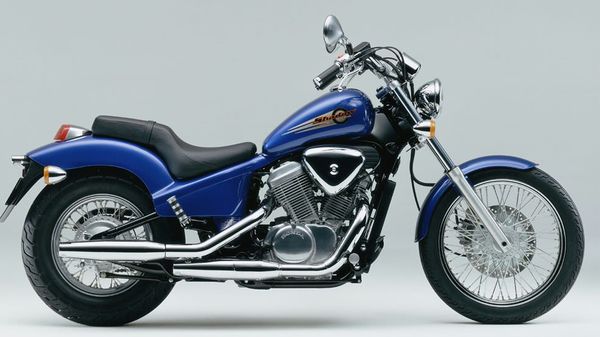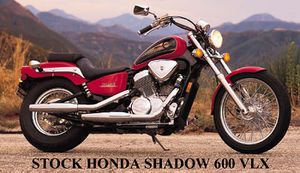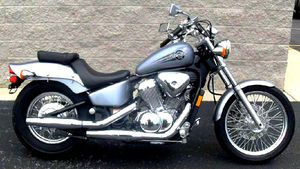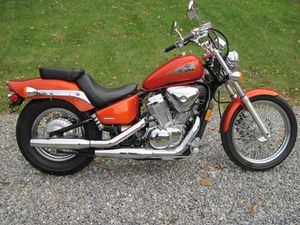The '' Honda Shadow 600 cruiser model appeared in 1988 in parallel with Honda Steed 600, in contrast to which it was focused exclusively on foreign markets - mainly Europe, North America and Australia. Factory designation Shadow 600 - VT600C; Steed 600 - NV600C. Both models are almost identical to each other, but differ in engine settings (the Shadow is more forced), saddle, trim levels and changes from year to year.
Lineup:
Main competitors:
Modifications:
- Honda VT600C Shadow VLX - regular version.
- Honda VT600CD Shadow VLX Deluxe - version in chrome package. It features chrome valve covers, a more comfortable double seat, a chrome trim on the rear fender and the very shape of the rear fender (double bend). Available for the US market only since 1993.
Since 1994, the Honda Shadow 600 model has received an increased fuel tank (9.0 L -> 11.0 L), and since 1995, a slight decrease in power (41 hp -> 39 hp) and a new, wider steering wheel. Since 1999, the Shadow 600 VLX has received one carburetor instead of two, which simplifies construction and maintenance and makes the bike even more similar to American models.
Since 2000, updated environmental regulations for European countries have come into force, due to which the model officially leaves this market, continuing to be produced and sold for the North American market. Only by 2008, the Honda Shadow 600 VLX finally rolls off the assembly line and ends its history.
In the Russian market, the Honda Shadow 600 model is not very popular. This is due to the wider prevalence of the Japanese version Steed 600, as well as the high cost (especially the American Shadow 600 VLX of the 2000s), making the purchase of the Shadow almost impractical.
Photos
Specifications
Specifications Honda Shadow 600 VLX:
| Model | Honda VT600C Shadow VLX / Deluxe |
|---|---|
| Motorcycle type | cruiser |
| Release year | 1988-2007 |
| Frame | steel tubular |
| Engine type | 2-cylinder, 4-stroke, V-shaped |
| Working volume | 583 cm³ |
| Bore / stroke | 75.0 x 66.0 mm |
| Compression ratio | 9.2: 1 |
| Cooling | liquid |
| Number of valves per cylinder | SOHC, 3 valves per cylinder |
| Fuel supply system | Carburetor, 2x Keihin 34mm - VT600C ('88 -'98)
carburetor, 1x Keihin 34 mm - VT600C (’99-‘07) |
| Ignition type | transistor |
| Maximum power | 41.0 h.p. (30.15 kW) @ 6,500 rpm - VT600C (‘88-’94)
39.0 h.p. (28.68 kW) @ 6500 rpm - VT600C (‘95-‘07) |
| Maximum torque | 51.0 Nm (5.2 kg * m) at 3500 rpm - VT600C (‘88-‘94)
48.8 Nm (4.9 kg * m) at 3300 rpm - VT600C (‘95-‘07) |
| Gearbox | 4-stage |
| Drive type | chain |
| Front tire size | 100 / 90-19 (57S) |
| Rear tire size | 170 / 80-15 M / C (77S) |
| Front brakes | 1 disc, 296 mm, 2-piston caliper |
| Rear brakes | drum, 160 mm |
| Front suspension | 39mm Telescopic Fork, 146.5mm Travel - VT600C ('88 -'96)
39mm Telescopic Fork, 120.0mm Travel - VT600C ('97-'07) |
| Rear suspension | linkage with monoshock (preload adjustment), stroke - 90 mm |
| Motorcycle length | 2310 mm |
| Motorcycle width | 760mm - VT600C ('88 -'94)
890mm - VT600C ('95 -'98) 880mm - VT600C ('99 -'07) |
| Motorcycle height | 1125mm - VT600C ('88 -'98)
1120mm - VT600C ('99 -'07) |
| Wheelbase | 1605mm - VT600C ('88 -'98)
1600mm - VT600C ('99 -'07) |
| Saddle height | 680 mm |
| Minimum ground clearance | 140mm - VT600C ('88 -'98)
135mm - VT600C ('99 -'07) |
| Acceleration to 100 km / h | 8.34 sec |
| Maximum speed | 145 km / h |
| Fuel tank capacity | 9.0 L (including reserve - 1.9 L) - VT600C ('88-'93)
11.0 L (including reserve - 3.4 L) - VT600C (‘94-‘07) |
| Motorcycle weight (dry) | 196 kg - VT600C ('88 -'93)
199 kg - VT600C ('94 -98) 205 kg - VT600C ('99-'07) 202 kg - VT600C Deluxe ('94 -'98) 208 kg - VT600C Deluxe ('99 -'07) |
| Motorcycle weight (curb) | 207 kg - VT600C ('88 -'93)
213 kg - VT600C ('94 -'98) 214 kg - VT600C ('99 -'07) 216 kg - VT600C Deluxe ('94 -98) 217 kg - VT600C Deluxe ('99 -'07) |
Fuel consumption
Average fuel consumption for the Honda Shadow 600 model, according to the test results, is 5.88 liters per 100 kilometers. The exact value depends on the riding style.
Documentation



